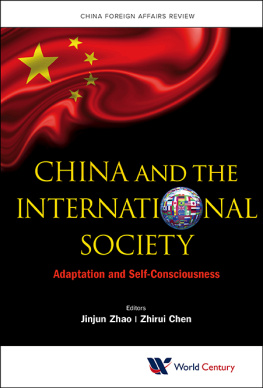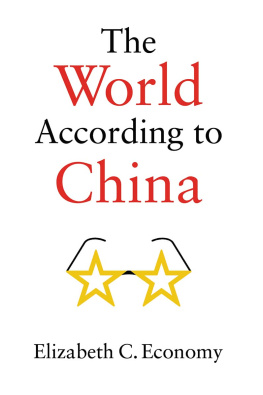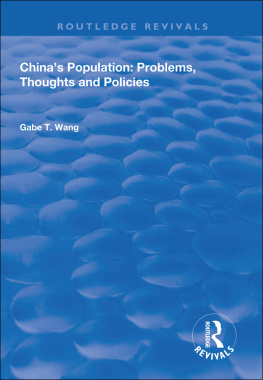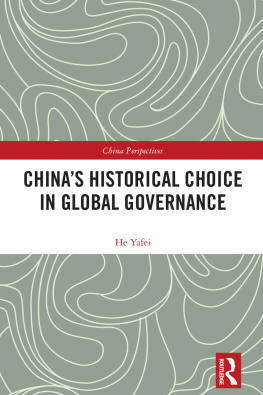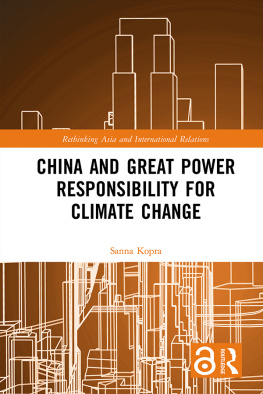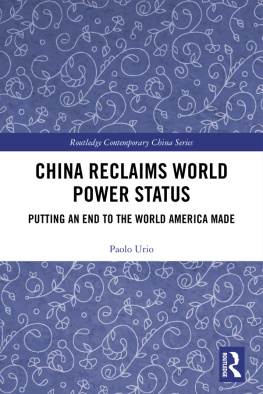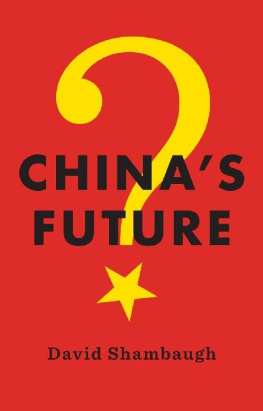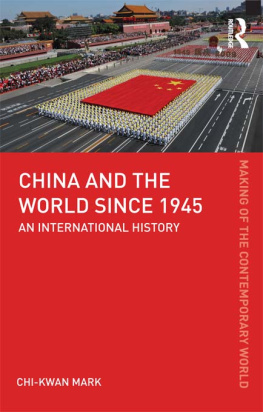
CHINA FOREIGN AFFAIRS REVIEW
Series Editors: Zhao Jinjun (China Foreign Affairs University, China)
Chen Zhirui (China Foreign Affairs University, China)
Vol. 1 China and the International Society: Adaption and Self-Consciousness edited by Zhao Jinjun and Chen Zhirui

Published by
World Century Publishing Corporation
27 Warren Street, Suite 401-402, Hackensack, NJ 07601
Library of Congress Cataloging-in-Publication Data
China and the international society : adaptation and self-consciousness / edited by Jinjun Zhao and
Zhirui Chen.
pages cm. -- (China foreign affairs review, ISSN 2334-4210 ; Vol. 1)
Includes bibliographical references and index.
ISBN 978-1-938134-50-0 (alk. paper)
1. China--Foreign relations--1949 I. Zhao, Jinjun, editor of compilation. II. Chen, Zhirui.
DS777.8.C447 2014
327.51--dc23
2014014495
British Library Cataloguing-in-Publication Data
A catalogue record for this book is available from the British Library.
Copyright 2014 by World Century Publishing Corporation
All rights reserved. This book, or parts thereof, may not be reproduced in any form or by any means, electronic or mechanical, including photocopying, recording or any information storage and retrieval system now known or to be invented, without written permission from the publisher.
For photocopying of material in this volume, please pay a copying fee through the Copyright Clearance Center, Inc., 222 Rosewood Drive, Danvers, MA 01923, USA. In this case permission to photocopy is not required from the publisher.
Content Editor: Chris Janiec
In-House Editors: Dong Lixi/Chitralekha Elumalai
Typeset by Stallion Press
Email:
Printed in Singapore
Editorial Board
China Foreign Affairs Review
Series Editor(s)
ZHAO Jinjun (China Foreign Affairs University)
CHEN Zhirui (China Foreign Affairs University)
Editorial Board
Chen Zhirui (China Foreign Affairs University)
Ja Ian Chong (National University of Singapore)
Da Wei (China Institute of Contemporary International Relations)
Fan Jishe (Chinese Academy of Social Sciences)
Taylor Fravel (Massachusetts Institute of Technology)
G John Ikenberry (Princeton University)
Jiang Guoqing (China Foreign Affairs University)
David Kang (University of Southern California)
David M Lampton (The Johns Hopkins University)
Jeffrey W Legro (University of Virginia)
Li Wei (Renmin University of China)
Liu Feng (Nankai University)
Iver Neumann (London School of Economics and Political Science)
Pang Xun (Tsinghua University)
Vincent Pouliot (McGill University)
Pu Xiaoyu (University of Nevada)
Qin Yaqing (China Foreign Affairs University)
Robert Ross (Boston College)
Randall Schweller (Ohio State University)
Shi Bin (Nanjing University)
Su Changhe (Fudan University)
Su Hao (China Foreign Affairs University)
Wang Yizhou (Peking University)
Wei Ling (China Foreign Affairs University)
William C Wohlforth (Dartmouth College)
Yin Jiwu (Beijing Foreign Studies University)
Zhang Qingmin (Peking University)
Zhang Yunling (Chinese Academy of Social Sciences)
Zhao Jinjun (China Foreign Affairs University)
Zhou Fangyin (Guangdong University of Foreign Studies)
Zhu Liqun (China Foreign Affairs University)
Contents
Chapter 1 The Self-Consciousness of Chinese-Characteristic Diplomatic Practice and Theory
Yang Jiemian
Chapter 2 China and International System: Two-Way Socialization under the Logic of Practice
Zhu Liqun
Chapter 3 An Analytical Study of the Ideological Sources of Chinas Conduct
Zhang Qingmin and Lee Min Gyu
Chapter 4 Self-Generated Transformation: On Chinas Agency in Its Interaction with International Human Rights Norms
Chen Zheng
Chapter 5 Border, Geopolitics and Chinas International Relations Studies
Zheng Yongnian
Chapter 6 Evolution of Neighborhood Concept and Chinas Foreign Strategies
Zhong Feiteng
Chapter 7 The Role and Influence of Chinas Mainstream Media in South China Sea Disputes An Analysis from the Perspective of Signaling
Liao Lei and Ma Mengli
Chapter 8 Public Policy and Cross-Border Investment by Chinese Enterprises
Guo Hong
Chapter 9 Chinas Approaches and Future Prospects for Participation in UN Peacekeeping and Peacebuilding: A Report Based on Field Research of UN Peacekeeping and Peacebuilding Missions in Africa
Li Dongyan
Chapter 10 Origin of the Forum on ChinaAfrica Cooperation
Li Anshan
Preface
What is the relationship between China and the international society? For both China and the world, this is a long historical question, which has been gaining even greater theoretical value and practical significance, since Chinas reform and opening up. In this process, China adopted changing itself and impacting the world as the major mode of interaction with the international society.
However, it is contended by the people who feel unease at Chinas rapid development and eager quest for markets, resources and other national interests, that this mode of interaction is being changed. With Chinas global influence expanding fast, the international society has renewed its perception of this country, and elevated expectation and request of Chinas global responsibilities. Chinas perception upon its own identities in the international system, as they maintained, may also have been changed, which would definitely impact Chinas understanding and behavior in dealing with foreign relations. According to their logicism, confidence from its newly-acquired strength, self-consciousness of its own national interests and aspiration for national rejuvenation, all these are mingled together to have been altering Chinas mode of interaction with the international society.
At the backdrop of a transiting and reshuffling international system, people acknowledged Chinas tremendous contribution to stabilizing the global economy against volatile fluctuations and readjustments, but unavoidably rebuked China, and even defiled Chinas image and reputation for its growing military strength, territorial and maritime disputes, greenhouse gas emission and climate change policies, etc.
This seemingly paradoxical reality reveals, to some extent, the actual relationship between China and the international society. Some of the concerns and skepticism get right to the point. However, to see a complete China, people need to take different perspectives and frameworks. Chinas basic facts that preset its current development and the future, such as geographic conditions, historical traditions, political and social institutions and cultural ideas, should have been taken as the starting point to get to know China. From there, people could truly appreciate the tremendous progress China has made in political, economic, social and diplomatic areas.
More importantly, changing itself and impacting the world, as the mode of Chinas interaction with the international society has not gone through any fundamental changes, despite of problems, challenges and even setbacks it met. So, we can safely draw upon it as the key to understand the theme, ideas and academic views in this volume. The authors have a deep understanding of these basic facts and Chinas foreign relations. They enquired the relationship between China and the international society from different perspectives with different problem awareness. Based upon Chinas national interests and identities, these scholars conscientiously explored their research questions according to the trend, concepts and logics of the evolution of the international society. They tried to make an ideational and theoretical innovation, and put forth recommendations for Chinas diplomatic practice. These articles reflect their understanding and respect of the widely accepted concepts, norms and institutions, and express a hope that Chinas foreign strategies, ideas, policies and behavior can also be understood and respected by the international society. In one word, they made exploration, explanation and self-reflection out of critical consciousness, with an intention to seek understanding and consensus.
Next page
